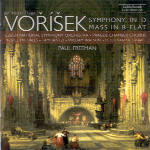Czech composer Jan Vorišek (1791-1825) was a talented musician just beginning to make a name for himself, particularly as a composer of piano music, when he died prematurely of tuberculosis. The excessively enthusiastic notes to this release take full advantage of speculative historical hindsight and describe his orchestral style as an amalgam of Beethoven’s (which he may have known) and Schubert’s (which he certainly didn’t), asserting in passing that “Beethoven was never a great melodist…(!)” This hardly corresponds to the reality of what you actually hear on the disc, but it represents the only questionable aspect of this otherwise splendid production.
Vorišek’s style arises directly from the classical language of Haydn, Mozart, and Beethoven. Of incipient Romanticism or the Schubertian long melodic line there’s nary a trace, and the music is none the worse for that. His single symphony might pass for early Beethoven: indeed, the end of the first movement exposition apparently lifts a famous passage directly from the finale of the older composer’s Fourth Symphony, but this doesn’t diminish Vorišek’s modest originality. You can hear this at work, among other places, in the characterful use of timpani at the very beginning and in the wonderfully passionate minor-key opening of the slow movement. For some time now, the reference recording of this piece has been Charles Mackerras’ reading on Hyperion with the Scottish Chamber Orchestra. Paul Freeman does him one better, having a superior orchestra, more tactile recorded sound, and slightly broader tempos that, combined with punchier accents (especially in the first movement), give the piece an appropriately grander stature. Let’s just say that Freeman evidently views the work as closer to Beethoven while Mackerras places it closer to Haydn and Mozart.
Mackerras couples the Vorišek symphony with another singleton effort, by Arriaga. Cedille gives us more Vorišek, his marvelous Mass in B-flat, which (I believe) receives its CD debut recording here. This piece really is a find. Close in style to the language of Haydn’s late masses, it contains numerous original touches, such as the thrilling augmentation of the fugue subject toward the end of the Gloria, an almost violent Crucifixus characterized by syncopated rhythms and jagged interjections from trumpets and drums, a sweetly lyrical second Hosanna following the Benedictus, and a startling ending scored for pianissimo timpani and brass. Its stylistic provenance may be clear, but there’s no other mass setting quite like it, and fans of choral music really owe it to themselves to give it a listen.
Once again Freeman turns in an excellent performance (though he should have had a soloist intone the opening lines of the Gloria and Credo, as Vorišek, designing the work for a genuine liturgical setting, leaves these to the officiating priest). His soloists manage their assignments capably, the Prague Chamber Chorus sings with appropriate fervor, and the recording copes with the vast reverberation of the Rudolfinum in Prague very well. At the loudest moments the textures tend to thicken a bit, but this seems primarily a result of Vorišek’s tendency to keep all of the parts close to their middle register, creating a certain density of sound (and I suspect making the work easier to perform by early 19th century church choirs). This is, in any case, a major release and a very pleasant surprise. Good work, Cedille. [11/14/2001]
































